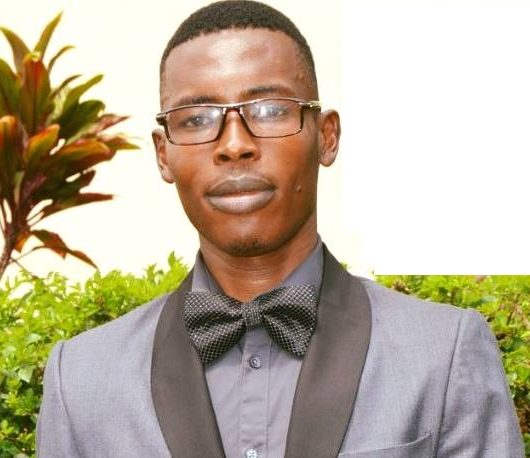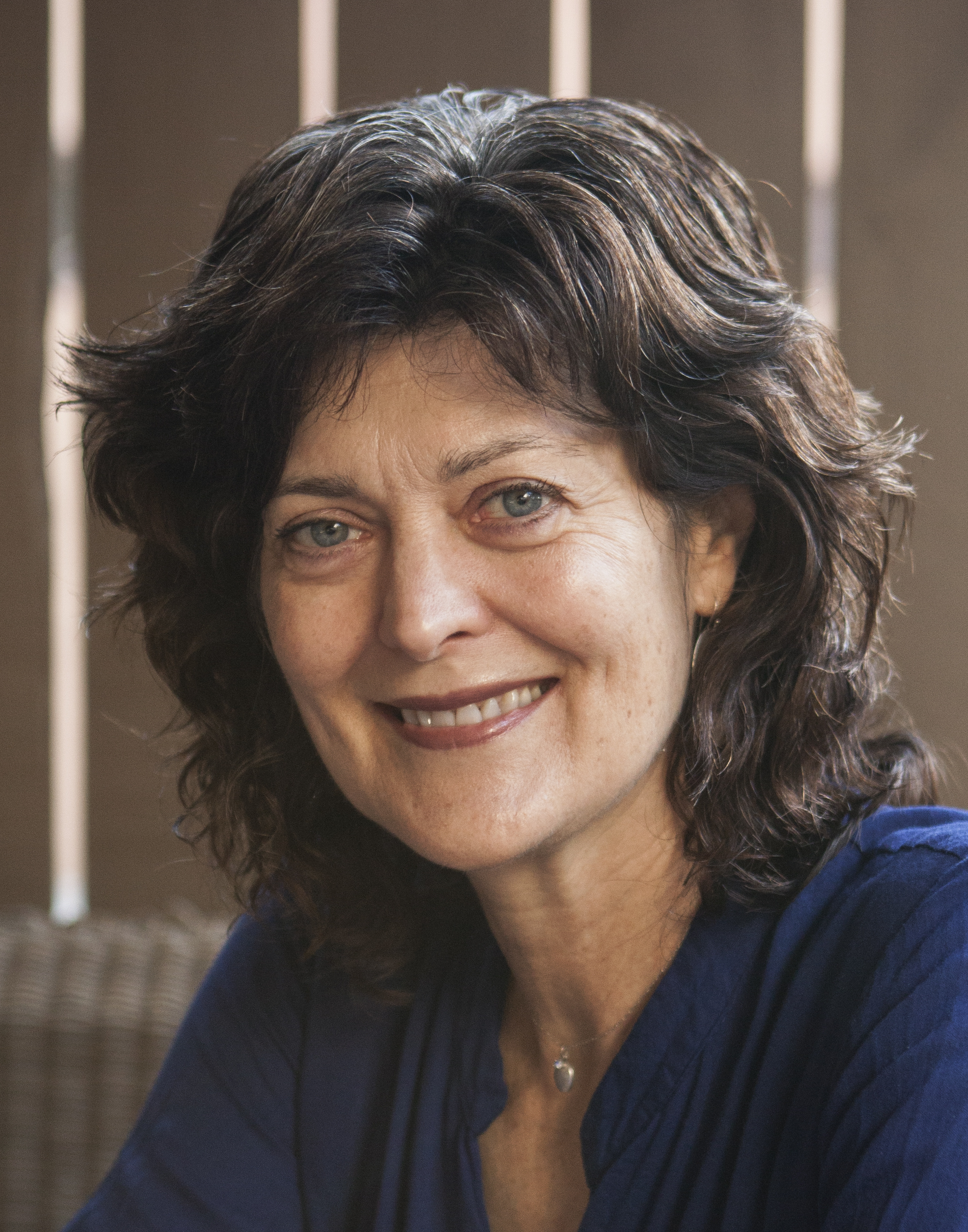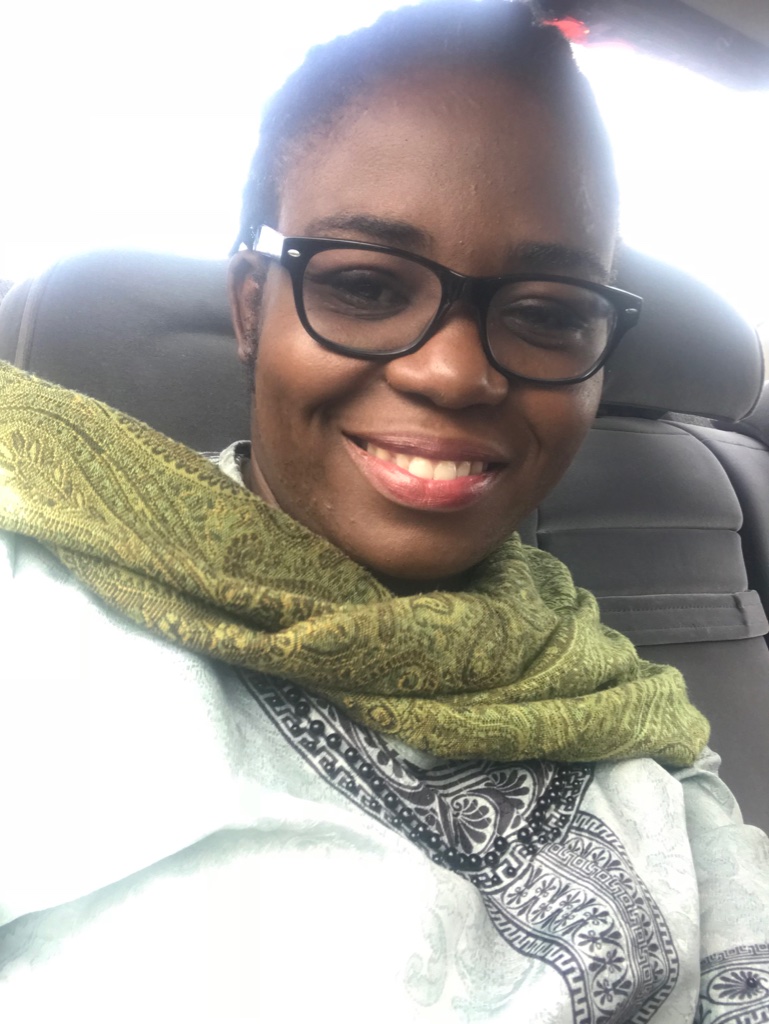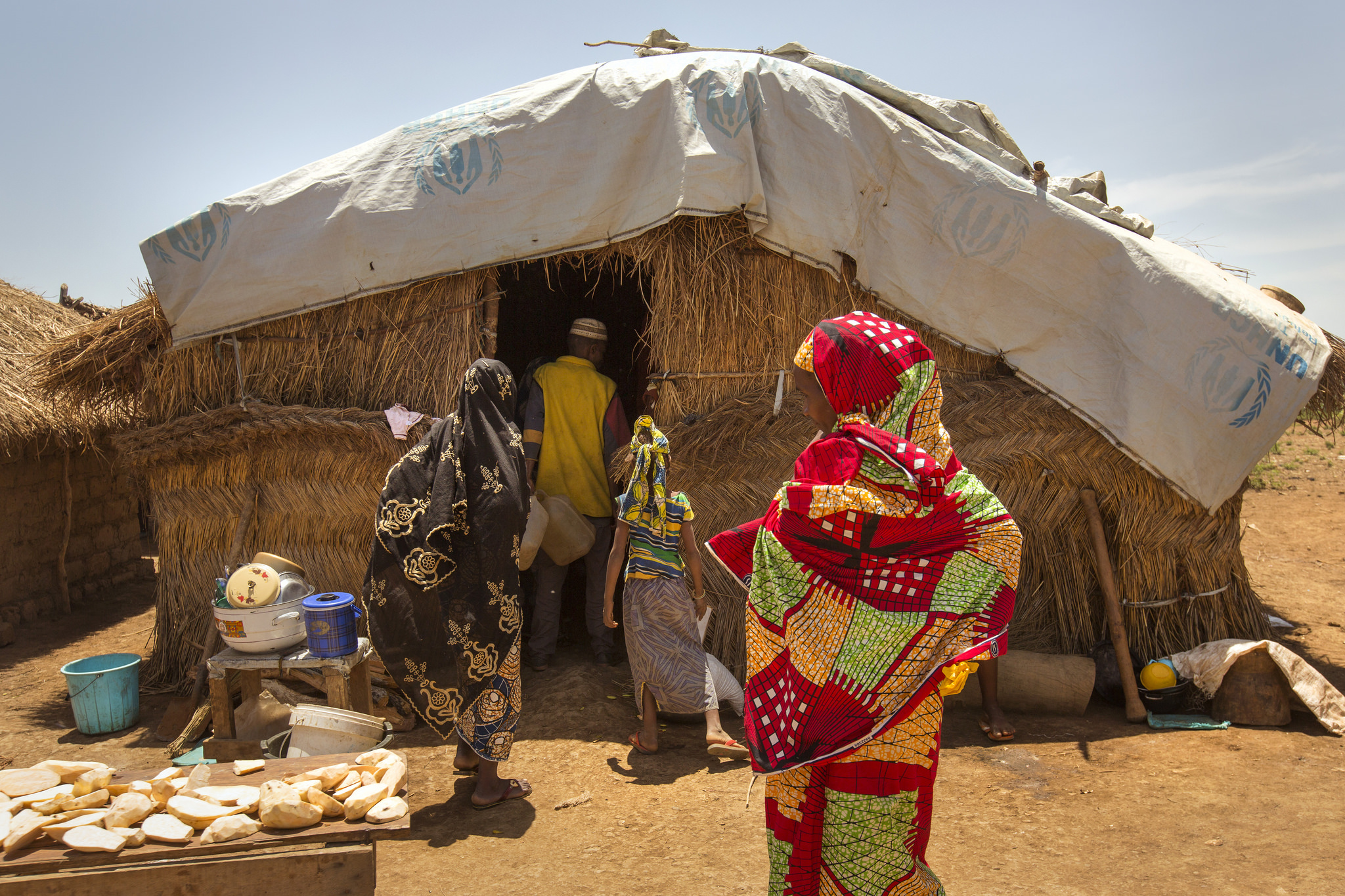
What is the relationship between gender and authority in different religious communities in Cameroon? Our project addresses the intersection of women, religion, and ways of being modern in the nation-wide Catholic Women’s Association, a small group of Muslim women who meet regularly in Yaoundé, and a Muslim and “traditional” village in the Adamawa region of the country. But this question immediately raises additional ones, because no “community” is hermetically sealed for examination by the external gaze.
Any discussion of patterns and practices of authority within these communities, therefore, also needs to take into account the relations of authority, intended or unintended, between these communities and outside actors, especially with a) the state, b) the humanitarian world of nongovernmental organizations, and c) given our research, interactions with members of our team. Each of the communities we address in our project has had different levels of interactions with these actors, and with us. We also note that no one is a completely passive agent in any of these relationships.
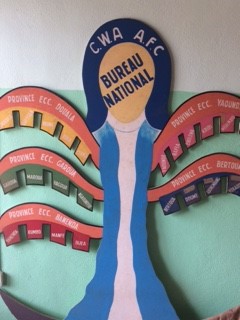
Our previous essay for Contending Modernities explored some of the structures of authority within Catholicism, as well as some of the dynamics in the Catholic Women’s Association (CWA) in Cameroon’s capital city of Yaoundé. We begin with a short update on additional research in Bamenda (in the Anglophone part of the country), before describing our visit with Muslim communities. A visit to Bamenda demonstrates that women of the CWA take great pride in their work in several domains: providing the sole Catholic women’s entity that crosses the Anglophone-Francophone linguistic divide (in a context of an Anglophone secessionist demand), developing a center at the Bamenda headquarters to assist women in need with classes in sewing and computers (which we plan to make a contribution to), and working within the national electoral system.
One of us attended an annual meeting of one of the district associations, in which CWA members celebrated their accomplishments for the year, hosted a priest as speaker, and broke into small groups to address important questions for the upcoming elections. Lines of authority appear to be fairly firm between clerics and laypersons; the lay womens’ groups each have a priest who acts as a kind of mentor to the group, and in turn clerics respect the women elected to significant positions in the organization. This is a group in which the leadership tends to be both highly professionalized (in terms of the procedures of the organization and the professions of women in the group), and well-established within the Catholic hierarchy of the country.
In the small group of Muslim women in Yaoundé, the founder of the group is also its de facto leader: she brought the group together and plays a large role in making it work, both in its religious component (the women meet regularly to study the Qur’an and also to learn Arabic with a small rotating group of imams and instructors), and its mutual assistance component.
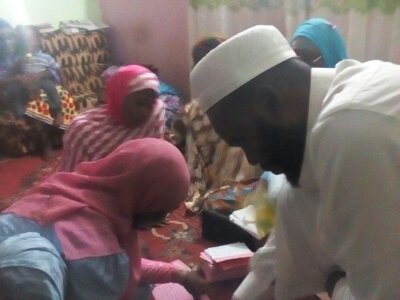
Regarding the latter, the women have tried several projects to supplement their income, including growing food on a small plot of land, making therapeutic black soap, and most recently, making laundry soap and a juice beverage from a local plant.
Most of these projects became possible because of relations with government authorities. Many civil society and women’s groups usually go to the state first for technical, financial, or logistical support. For this group of Muslim women (located in the capital and central region of the country), relations with the state occur in several ways. The women, for example, take part in a number of activities sponsored by the Ministry for the Promotion of Women and the Family, as well as by the Ministry of Social Affairs. These government ministries fund such local groups to work with affected populations through establishing and administering centers “for the promotion of women and the girl-child.” Through these centers, marginalized women can train for jobs as seamstresses or for eventual employment in the restaurant, hotel, or information industries, to help them become more independent. These women, however, also frequently take the initiative to propose projects of their own to gain support from both national and local government authorities.
The decision-making regarding which small enterprises to propose appears to be fairly democratic in the group, with ideas coming from various women of different ages. Different patterns of authority influence whether or not each of these schemes work: for example, the plot to grow food was abandoned because husbands did not want their wives to travel outside of the neighborhood to the site (thus, intra-familial, gendered lines of authority); the black soap-making was abandoned because the woman who was to train the group first implied that she would provide her services without charge, then decided to set a fee that was too high for the women to pay (the power of an external “expert” authority to control the terms of assistance). The laundry soap and juice efforts, however, appear to be successful thus far. (We note that we are providing support for this initiative through our Contending Modernities grant, but we have set no conditions regarding what projects the women engage in with the funds.)
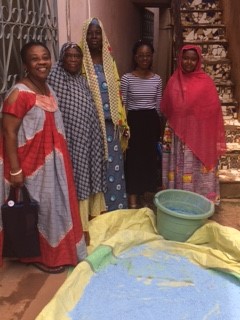
In Cameroon, there are numerous channels for women’s and civil society groups to work with nongovernmental organizations (NGOs). Humanitarian and development NGOs often go through state authorities to obtain contacts within the populations they want to serve based on their missions and objectives. Sometimes, however, individuals or groups in need of such services also approach NGOs directly. Either way, of course, such relationships do not always succeed. Indeed, there are cases where local groups do not want to cooperate with NGOs, especially when these organizations press for changes to local traditions that they are not prepared to tolerate. Evidence from two research trips thus far indicates that this is the case for the group of traditional Muslim women in the Adamawa region. For example, the NGO CARE conducted one project to bring clean water and another to increase women’s autonomy in the community. The second project ran into problems because only a small number of women signed up to participate, most likely because the project itself challenged the patriarchal character of authority in the community. This example raises two interrelated issues with NGOs: NGOs often condition aid on the participation of a certain percentage of the population in the project; but in failing to reach this number, NGOs also obstruct their own goal of providing services to a group that needs assistance.
The dynamic at work between these actors is interesting on several levels: when marginalized women in given milieus seek to enter into a relationship with humanitarian organizations, thus benefiting from NGO “modernization” programs, they are opening themselves to a kind of alterity, a voluntary inscription into a process to try something new that might improve their living conditions. For example, on our first visit to the Adamawa Muslim group, several of the women noted that they enjoyed working with a previous NGO who taught them knitting, because it allowed them to do something to earn money as well as learn about things outside of their community.
At the same time, as is well-known, humanitarian and other external actors can bring ideas, programs, pressure, and funding for changes that are too radical for those they wish to “help,” although in this case it appears that men and women view these changes differently. It is important for our project to try to discern these patterns and nuances.
We are gaining a greater appreciation for pre-existing structures of authority in these groups, as well as members’ assumptions about authority within our own group of researchers. While we cannot completely overcome the professor/student hierarchy, we now realize that our interlocutors assume there is a stronger division of authority and decision-making within our group than (hopefully) exists. We hope to demonstrate our joint decision-making to these groups of women as well as develop ways to allow for joint ideas and processes to develop with them in our research. We realize that we are one more entity—although not as influential as the state or NGO authorities—that can mobilize resources that affect the internal dynamics driving these communities, and that this fact requires continued reflexivity on our part. Our notes in this post reflect some of our findings on multiple lines of authority within these communities as well as between them and the state, NGOs, and ourselves. We anticipate that these reflections in addition to ongoing research will raise additional questions about conceptualizations of authority and gender in religious communities.
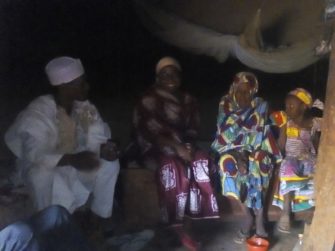
The Adamawa group is one of the most interesting for our analysis of lines of authority. We are still assessing a recent research trip by three members of our team, but here note two features of the group from a previous trip last fall. First, gendered relations are both clear within the community and possibly changing slightly—the (male) princes were our primary interlocutors, although they took us to the women’s compound (of the community leadership) to have an initial conversation about our research with some of the women. The princes interpreted for us, also prodding the women to feel free to speak to us about their concerns. We did not press very much, however, thinking that a subsequent trip, in which the two graduate student members of our team (one woman and one man) were invited to stay in the community, would provide less abrupt means of interacting. Second, both women and men in this community appeared to be eager for input from external actors. The princes, for example, told us of methods they had heard to fatten cattle and make other agricultural “modernizations,” and the women remarked that they enjoyed the training of a previous NGO that came through to teach them how to crochet, because it gave them something productive to do that also earned money. Unlike Yaoundé, this community’s ties with outside NGOs have diminished because of its propinquity to the North. Often exaggerated fears of Boko Haram activity have made many NGOs reluctant to work in the region. However, fear of insecurity is not the only explanation for the absence of NGO’s in the village, although the risk is real. (Indeed, the border with the Central African Republic is only a few kilometers away and many incidents of hostage-taking as well as attacks on villages have been recorded.) There is also the extent of the community’s closure to this category of actors, especially when it comes to interventions targeting women. These organizations are seen as elements of disorder in the religious sense of the word. On an ad hoc basis, some outside groups can be admitted. This is the case for the Peace Corps which is very active in the Northern part of the country. One of its representatives has been working in the village for more than a year and has been providing technical and material support in livestock farming to the community. However, she is essentially exclusively in contact with men in her work. It can be inferred that NGOs involved in the community are either not particularly interested in the local women (this appears to be the case of Care International) or are not able to gain meaningful access.
In sum, there are several layers of authoritative practices—gendered, religious, political, financial, external—within these communities. But it would be a mistake to focus only on particular gendered aspects without also examining the authority exercised by external actors, of which we are one. In subsequent work, we will explore in more detail the implications of the intersections of these lines of authority, along with their relationship to issues of community and identity.

